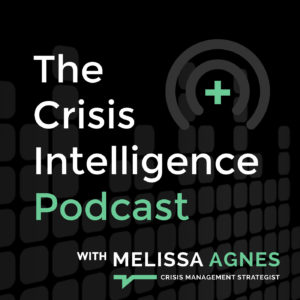Welcome to episode #036 of The Crisis Intelligence Podcast, with Melissa Agnes and Garth Rowan.
 Crisis simulations are an amazing way to test your crisis plan and strengthen your team’s crisis communication skills. I’ve been conducting crisis simulations for a few years now and the results that they bring to my clients never cease to amaze me.
Crisis simulations are an amazing way to test your crisis plan and strengthen your team’s crisis communication skills. I’ve been conducting crisis simulations for a few years now and the results that they bring to my clients never cease to amaze me.
That said, I often get asked questions like “how do I conduct a crisis simulation?”; “who should be involved in the exercise?”; “what should I test?”; etc. So I decided to dedicate this week’s episode of The Crisis Intelligence Podcast to answering these questions and helping those of you out there who are interested in conducting a crisis simulation, develop the best scenario and exercise you can for your team.
With me in this podcast is my friend and colleague, Garth Rowan. Garth and I work together quite often, combining our strengths to provide our clients with life-like simulations, so it made perfect sense that I would ask him to join me in this conversation. Within this episode, Garth and I have fun answering commonly posed questions, and we share our own experiences while detailing what makes for a great crisis simulation.
This episode of The Crisis Intelligence Podcast discusses:
- What a crisis simulation is and why it’s such a rewarding exercise.
- How to set clear objectives to get the most out of your simulation.
- Tips for developing a realistic and successful scenario.
- How to conduct a debriefing in order to gain maximum value from the day’s exercise.
- Specific do’s and don’ts that we’ve learned over the years.
It’s a fun and insightful listen. Enjoy!
Download this file (right-click and choose “save as”)
Subscribe: iTunes | Stitcher
Running time: 54:57
Get connected!
Have questions, comments or suggestions? Email melissa@melissaagnes.com
Subscribe and leave us a review on iTunes and/or Stitcher
Subscribe via email
Learn more about Melissa Agnes
Follow Melissa on Twitter: @melissa_agnes
Connect with Melissa on LinkedIn
Learn more about Agnes + Day’s crisis simulation platform and exercises.
Learn more about Garth Rowan
Connect with him on LinkedIn
Email Garth directly: garth@beready.ca
Check out Garth’s blog posts on The Crisis Intelligence Blog
Thanks to Garth for having this fun and insightful conversation with me!

Author of Crisis Ready: Building an Invincible Brand in an Uncertain World, Melissa Agnes is a leading authority on crisis preparedness, reputation management, and brand protection. Agnes is a coveted keynote speaker, commentator, and advisor to some of today’s leading organizations faced with the greatest risks. Learn more about Melissa and her work here.

I am a tactical police officer, with responsibilities in designing and moderating training simulations. While listening to this episode #036, I compared Melissa’s and Garth’s perspectives on crisis simulations to public safety training drills. I was amazed at the similarities in simulation preparation, administration, contingency planning, and debriefing.
I have 15+ years rotating through roles as both controller and participant of police tactical training scenarios. The bulk of my experience is in SWAT-specific simulations – combining Incident Command System, tactical operations, K9, airship, sniper, crisis/hostage negotiations/intelligence, tac medics, and dispatch/support. Each simulation stresses a combination of functions and capabilities, which generally also includes the physical force-on-force aspects with live roleplayers.
I’ve also had a two opportunities to be the overall coordinator/controller of two full-scale public safety exercises (100+ live roleplayers; 50-75 participants; 15-20 controllers/safety officers) that require the combining or meshing of two independent crisis teams of: government (police; fire; medic; EM) and private entities (hospital; high school).
Again, even with the vast difference in organizational missions and situations, and subtle differences in language/terminology, the similarities in the “testing” processes, strategies, and philosophies described by Melissa and Garth are mind-blowing. I recommend this episode to anyone in LE/FD/EM responsible for moderating or coordinating scenarios, whether tabletop exercises or live in-field drills.
Louis Hayes
You’re always so eloquent with your words, Lou!
Thanks so much for sharing your thoughts. You bring up a great point that effective crisis comms training is effective crisis comms training. Like you said, the terminology may vary and the intensity may vary, but in essence, crisis communication is dependent on powerful and effective communication skills and it’s only through testing and training that you will learn the nuances and areas of vulnerability that can make or break successful crisis management.
I’m glad you shared your thoughts and experience here. Hopefully it will help others realize that planning and testing is important on every level of crisis and emergency communication.